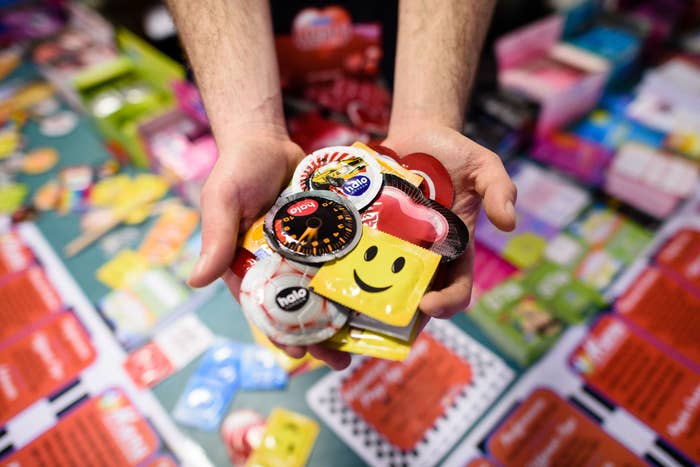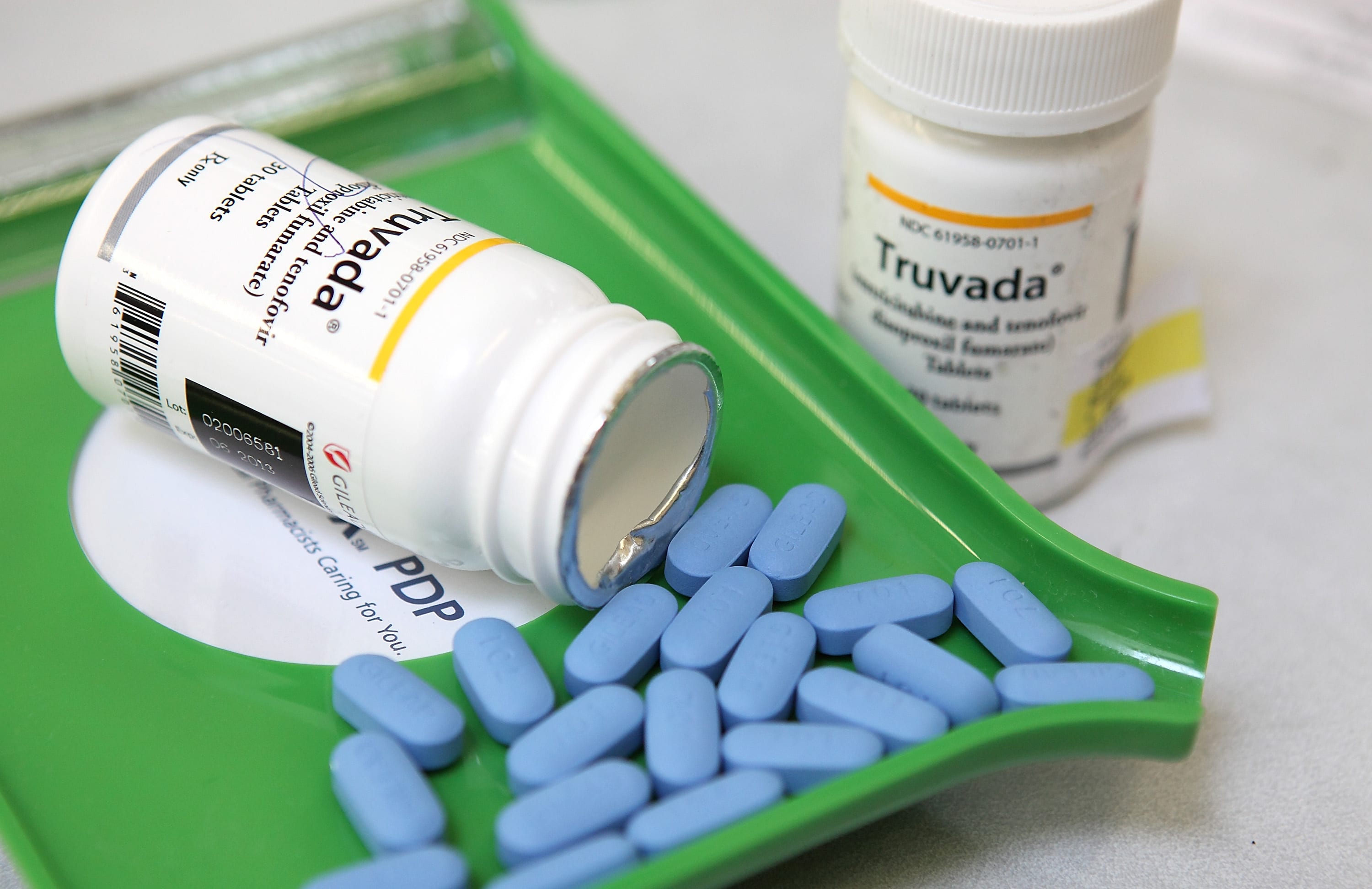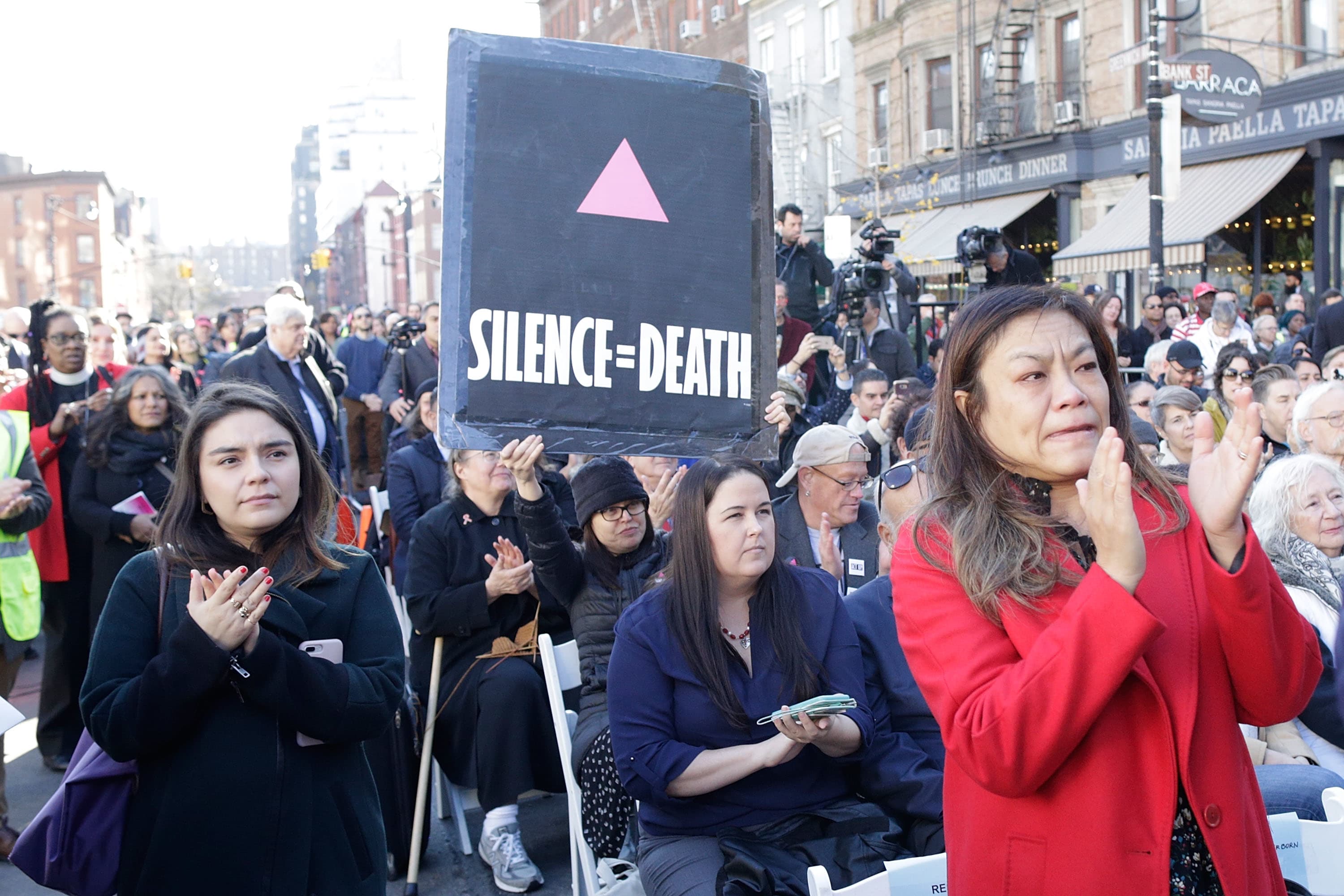
Before text etiquette, date debates, and the acceptability of office hook-ups, safer sex practice is the first line of discussion for the sexually available. While the established line of thinking is that those sexually active have not only a responsibility to themselves and their partners—but to society—to wrap it up, some insist that if both parties consent, they have a right to forgo condoms. “Despite the fact that I encourage people to have safe sex, we've never used condoms ourselves,” says Ash, 18, of her herself and her boyfriend. While the two are now monogamous, they initially met and slept together as anonymous sex partners. “I think if both consent, it's perfectly okay,” she adds.
Safe sex is now referred to as “safer sex,” because there is no way to ever ensure an entirely “safe” sexual experience. We’ve all heard the line about not wanting to use a condom because it feels better without one. However, some like Ash and Stephen, 51, feel that if both parties are of age and consent, there is nothing immoral about barebacking. “Oh there’s no question that it’s more enjoyable,” says Stephen, on the physical sensation of unprotected sex. Furthermore, not only do they feel it is “okay,” but that it’s not just the physical sensation of unprotected sex they enjoy, but rather, the risk associated with unprotected sex that gets them off. AVERT defines unprotected sex as “having sex (vaginal, anal or oral) without using a condom.”
“I think that it adds spice, it adds a risk of being caught, a risk of being in danger, it adds a thrill to a lot of people. I think it’s common; I don’t think it’s rare,” says Dr. Michael Aaron, NYC-based sex therapist and author of the upcoming book Modern Sexuality, of individuals who are turned on by risky sex. “I think that part of the danger of it makes the experience feel more thrilling and more exciting.”
Practicing unprotected sex is extremely controversial. Intentionally practicing risky sex has made headlines through the angle of “bug chasing,” or gay men allegedly actively seeking to seroconvert, also reported on as “roulette parties,” which Aaron has previously debunked in an article for Huffington Post. While it makes for a striking headline, there is no proof these actually exist, and furthermore, making them out to be a “thing” is extremely stigmatizing and misrepresentative of the gay community.
I think that most people have at some point in their life had a fantasy that feels risky. But there’s a big difference between actually fantasizing about it and acting on it.
“They started as a rumor. These roulette parties don’t really exist. Doing risky things is thrilling for a lot of people,” Aaron says. He’s right. Those interviewed for this article came from a wide variety of sexual orientations. “I think that most people have at some point in their life had a fantasy that feels risky. But there’s a big difference between actually fantasizing about it and acting on it,” Aaron adds.
Indeed, every individual interviewed for this article reported enjoying casual sex without condoms for the risk was in fact taking some safer sex measures, such as birth control and/or PrEP (Pre-exposure prophylaxis), demonstrating that for those who get off on the thrill, it’s largely the mental risk. They spoke of getting off on the perceived danger or submission, rather than an actual desire to experience life-changing consequences.

“It's one hundred percent about the psychological aspect of it,” says Ash, who is on birth control. “I’m the submissive person. I find the act of possibly exposing myself to be really erotic in the concept of total submission,” agrees Stephen, who uses PrEP and is tested every three months. “There’s no guarantee, but it’s a reasonable precaution. I don’t know if anyone has any right to say ‘Well you shouldn't be doing it in the first place, condoms are more effective’ and so on and so forth. That’s my perspective. I have met other submissive men who feel the same way, and I have met other submissive men who say, ‘No way, I would never let that happen!’" he adds.
When used correctly, Truvada (PrEP) provides 92 percent to 99 percent reduction in HIV risk for HIV-negative individuals who take the pills every day as directed. For heterosexual couples concerned with pregnancy, Planned Parenthood recommends using a combination of condoms and a birth control method such as the pill or an IUD; the condom is about 82 percent effective at preventing pregnancy when factoring human error. While rightfully so, STIs such as herpes are becoming destigmatized thanks to some great activism, other STIs such as gonorrhea or chlamydia can be harmful, especially to women, when left untreated. While living with HIV today is no death sentence and many have an undetectable viral load with medication, a seroconversion is still a major life event. “Almost everyone is trying to avoid HIV even though the medical treatment is better,” says Aaron.
It drives at that point that it’s not just about you and it’s not just about your singular experience, it’s about the relationship you might have with the partner, and it’s about the public at large. There’s a reason they call it public health.
Despite safer sex precautions other than condoms, such as birth control and PrEp, cutting condoms out of the equation with a new partner whose sexual history is unknown is still largely considered riskier than using them in conjunction as an additional line of protection. Beyond not wanting to personally engage in riskier sexual behavior, while some argue raw sex is their right, others feel that such behavior is selfish, as an increased risk for STI transmission or unintentional pregnancy impacts society on a scale larger than those engaged in the direct sexual act.
“I honestly think it does [affect society as whole] because people don't take sex as a serious thing, and something that you have to be mature enough to do,” says Laiza, an upcoming college freshman. “I believe safe sex is important not only because it can prevent unwanted pregnancies, but also keep both parties safe from sexually transmitted diseases one party could be carrying!”
Such mentality is behind the creation of the condom brand ONE, whose slogan is “Together We Are One.” ONE condoms made history in May for expanding sizing options in the U.S., after successfully negotiating with the FDA. “It drives at that point that it’s not just about you and it’s not just about your singular experience, it’s about the relationship you might have with the partner, and it’s about the public at large,” says Jared Maraio, ONE’s Senior Director of Brand Strategy. “There’s a reason they call it public health.”

A 2015 article in the Iranian Journal of Public Health found that U.S. taxpayers spend more than $12 billion each year on unintended pregnancy. The Office of Disease Prevention and Health Promotion reports the cost of STDs to the U.S. health care system is estimated to be as much as $16 billion annually (2008). And that's just ticking off public health concerns in America—never mind the global impact. “AIDS is the leading cause of death among young people in Africa and the second leading cause worldwide. In fact, adolescents are the only demographic in which the HIV infection rate is not declining globally,” Georgia Arnold, Executive Director of the MTV Staying Alive Foundation told Complex.
Consensual behavior, even if it’s risky, is something that as a society, should be legal and tolerated, as long as it doesn’t lead to the hurting, the mortality of life to another person.
Despite such statistics, some firmly believe that engaging in risky sex is their right. When asked about public health concerns held against consenting adult’s choice to forgo condoms, Stephen says: “I understand where you are coming from, but it’s my choice. It definitely is my choice.”
So, is it their right to engage in risky sex by forgoing condoms?
Keep in mind, these individuals aren’t taking zero precautions, but implementing their own safety measures (PrEp and/or birth control) to fulfill a kink (bareback or “risky” sex). “I would say consensual behavior, even if it’s risky, is something that as a society, should be legal and tolerated, as long as it doesn’t lead to the hurting, the mortality of life to another person,” says Aaron, name-checking a famous German case, which quite directly lead to the mortality of another person. In 2001, a German man, Armin Meiwes, made headlines by posting an ad for a "young well-built man, who wanted to be eaten,” and upon finding just that – going through with it, complete with olive oil, sauteed garlic, and South African red wine. He argued that he was not guilty because his meal consented, and that argument initially worked. However, after a retrial was opened to impose a tougher sentence, Meiwes was given life in prison.
A sex therapist who often takes more controversial standpoints, when Aaron was asked how he would advise a patient who came to him with a far less mortally dangerous kink than cannibalism, such as the dangers associated with unprotected sex, Aaron uses a harm reduction model. “What I want is to capture the feeling. What is the exciting thing? The exciting thing is that there’s something dangerous. There’s something unknown," Aaron says. "So what else can we do that will give you a taste of it, but will actually end up being safe? I work collaboratively, we brainstorm, we create scenarios, we role play, where the person can actually do something that will give them a taste of the theme actually putting themselves at risk.”

